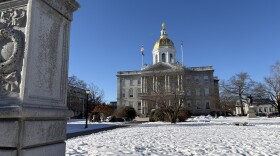In his inaugural address last week, Gov. Chris Sununu made it clear he thinks the state must — and can — act to reduce the state's high cost of electricity.
“We can’t be passive anymore," Sununu said. "We have to find the right solutions to get it done and get it done our way. Do we need to look at Northern Pass? You bet we do — 1,100 megawatts of clean, renewable energy? How do we say no to that when we have the highest rates in the country? We can help ratepayers.”
But doing that won’t be easy. Much has to do the nature of the energy market.
As Michael Harrington, a Republican lawmaker from Strafford and a former Public Utilities Commissioner: “There is no electric market in New Hampshire, that’s the first thing people have to realize. It’s a New England electric market.”
Harrington favors a free-market approach to energy reform, and has sponsored bills to undo the Regional Greenhouse Gas Initiative (also known as "RGGI") and to rein in the rulemaking power of the Site Evaluation Committee, the state body that must approve energy projects. Harrington thinks such steps would help, but says no one should expect anything out of Concord to have a major effect on electric bills anytime soon.
“There is no magic solution here," Harrington says. "It’s not a matter of, 'Good, we’ve got Republicans in control of the House and Senate and the Statehouse, and so we are going to pass the lower electric rate bill, and everything will go down 10 percent.' It doesn’t work that way.”
For consumers, electric bills boil down to two main factors: The cost of generating electricity and the cost of getting it to customers. Both are high in New England.
And while energy costs still make up most of an energy bill, the costs of generating electricity have actually been falling. But the cost of transmitting that energy has been rising — fast.
Jim Monahan represents the New England Power Generators, a power plant trade group. He says cutting that side of the bill will be tough.
“I think that would take some coordination among the New England governors to begin with. And I think it would take a real tough look at what got us here," Monahan says. "Did we overbuild the system? And then unwinding those investments is going to be particular challenging. You can’t just up and disrupt that process in the middle.”
Disruption is a concern for people concerned about our carbon emissions. They worry that programs to reduce renewable energy and conservation are on the chopping block. Bob Backus, the ranking Democrat on the House committee that handles energy policy, says conservation programs — which are funded by ratepayers — do save money.
“I think the issues should not be lower rates, it should be lower cost," Backus says. "Nobody pays electric rates. People pay electric bills. And if we can get the cost of energy down, even if we can’t lower rates, people save money.”
But the new governor — and the state’s business lobby — are focused less on average ratepayers and more on employers, particularly manufacturers, who shoulder huge electric bills.
Dave Juvet of the New Hampshire Business and Industry Association says high rates hurt the state when it comes to recruiting businesses, and trail only workforce issues as a concern among companies. But as someone who’s been watching this issues for years, Juvet doesn’t expect a solution to come easy, if at all.
“In a way it reminds me of the cost of healthcare," Juvet says. "And I think many of them, although they are looking for lower costs, they would be happy if they can at least bend the cost curve so it doesn’t increase so much."
Not exactly lower rates the governor wants — but probably more attainable.








